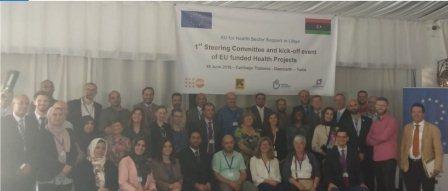The European Union (EU) and the internationally recognized Tripoli-based Libyan Ministry of Health officially launched five new EU-funded projects to support the Libyan health sector yesterday.
The EU says the projects cover a broad spectrum of priorities of the health system in Libya, with specific focus on 1-primary health care services, 2-blood transfusion safety, 3-nurse and midwifery education, 4-mental and psychosocial support as well as 5-prevention and management of non-communicable diseases (NCDs). The cumulative budget donated by the European Union to these five projects is approximately € 13 million.
The EU said that the new package comes in the context of the ongoing conflict in Tripoli, where the needs of the Libyan health sector are as urgent as ever.
At the launch event in Tunis yesterday senior Libyan health sector officials and their EU counterparts reviewed the progress of the start-up phase of the projects, discussed the impact of the recent crisis on implementation and agreed on the next steps for the upcoming period, the the Delegation to the EU in Libya reported .
The Head of Operations at the EU Delegation to Libya, Stefano Sotgia, opened the event thanking the Libyan officials for their commitment and commending the crucial role of the Ministry of Health, stressing that ”these projects are a result of a longstanding cooperation between the EU Delegation to Libya and the Ministry of Health, one that dates back to 2012. These projects reflect a common will to support the Libyan people during this difficult phase of the country’s history, based on a joint understanding of the challenges and needs of the Libyan health sector, in a spirit of true partnership. All the more important, these projects will also respond to some of the urgent needs of the population emerging from the ongoing crisis”.
Dr. Nagi Abdallah, Adviser to the Minister of Health, in his opening remarks, welcomed the EU-Libya technical cooperation in the health sector, stressing that “these projects address important issues and priorities of the Libyan health system. We hope that they will constitute a good example that will help our Ministry to improve the provision and quality of health care in our country”.
It will be recalled that the Faiez Serraj government in Tripoli set up the National Centre of Health System Reform in March 2017 which was launched in October of the same year. At the launch, Serraj said that healthcare system in Libya had to be radically reformed and more money put into it.
The NCHSR was set up to coordinate national efforts and international backing to reform and modernise the system. Headed by Samir Sagar, it operates in collaboration with the health ministry, and springs out of the Libya Health System Strengthening Programme (LHSS), set up between the Libyan authorities and the European Union.
The NCHSR’s goal is to:-
· restructure the health system;
· ensure full funding for a service that is free to patients at the point of use;
· involve the private sector;
· have a healthcare service in line with international standards;
· decentralise;
· have a service where health workers, whether in the private or public sectors, are properly paid for their work;
· develop a master plan to achieve universal health care in Libya.


















